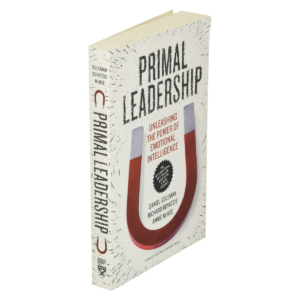
“When I compared star performers with average ones in senior leadership positions, nearly 90% of the difference in their profiles was attributable to emotional intelligence factors rather than cognitive abilities.”
~ Daniel Goleman
When asked to define the ideal leader, most will emphasize traits such as intelligence, determination and vision, leading to balanced performance and good decision making. These are of course important leadership skills but, while they’re necessary, they’re definitely not sufficient.
In his groundbreaking book of the same name, Psychologist Daniel Goleman first introduced us to the idea of something called “Emotional Intelligence”, back in 1995. His research found that truly great leaders were different to their less effective peers in one very important respect: They had a high degree of what he called ‘emotional intelligence’ or EQ.
When Goleman compared star performers with average ones in senior leadership positions, he found that nearly 90% of the difference was related to Emotional Intelligence factors rather than cognitive abilities.
Over the years, as the idea of EQ has caught on in the corporate world, it has become synonymous with Empathy. And again, while Empathy is a vital leadership dimension, it is just one of the five factors Goleman identified:
- Self-Awareness is the ability to recognize and understand your moods, emotions and drives, as well as their effect on others.
- Self-Management is the ability to control your impulses and to act in accordance with your own values rather than pure reactive instinct.
- Intrinsic Motivation allows you to pursue goals with an inner drive and persistence, even when they’re outside your comfort zone.
- Empathy is the capacity to understand how other people are feeling, and to reflect and respect those feelings in the ways you treat them.
- Social Skills relate to how you build and maintain personal and professional relationships
As you reflect on that list, consider your mindset: Is it fixed, leading you to believe that each of these factors is largely innate, and therefore can’t change? Or, do you have a growth mindset about EQ and your ability to improve each of these factors with focused effort?
Just as the myth surrounding the idea that your IQ is fixed from birth is false, so too is the idea that your EQ cannot be improved by a focus on each factor in Goleman’s list. For example, anyone who has experienced Mindfulness will be aware that their own self-awareness and particularly self-management can be improved with a relatively short amount of daily practice. Social skills can be taught and mastered, and we’ve seen individuals progress from an almost morbid fear of networking to harnessing the power of their social connections to improve their careers and increase their impact. Motivation is something we work on with clients every day – often the most important factor there is connecting their work with a sense of purpose. And finally, Empathy can be significantly improved through an understanding of the three levels of listening, something that they teach us coaches on day-one of our training!
Many organizations still focus on our success as an individual contributor as the primary measure of readiness for management. In most disciplines, this will completely exclude the EQ factors when considering who is ready to lead and inspire a team to do their best work. According to that quote from Goleman, Raw IQ, or a deep knowledge within a domain are just 10% of what makes a great leader.
With that in mind, perhaps you’re ready to redefine your own readiness for leadership?
This week’s inquiry…
What defines YOUR ideal leader?
Dive Deeper…
While teaching math to seventh graders in a New York public school, Angela Duckorth, author of the book Grit, quickly realized that IQ wasn’t the only thing separating the successful students from those who struggled. Where do you see her theory of grit overlap with emotional intelligence?
“Grit is living life like it’s a marathon, not a sprint.”
Drawing from decades of research within world-class organizations, the authors show that great leaders excel not just through skill and smarts, but by connecting with others using Emotional Intelligence competencies. Primal Leadership vividly illustrates the power—and the necessity—of leadership that is self-aware, empathic, motivating, and collaborative in a world that is ever more economically volatile and technologically complex.


